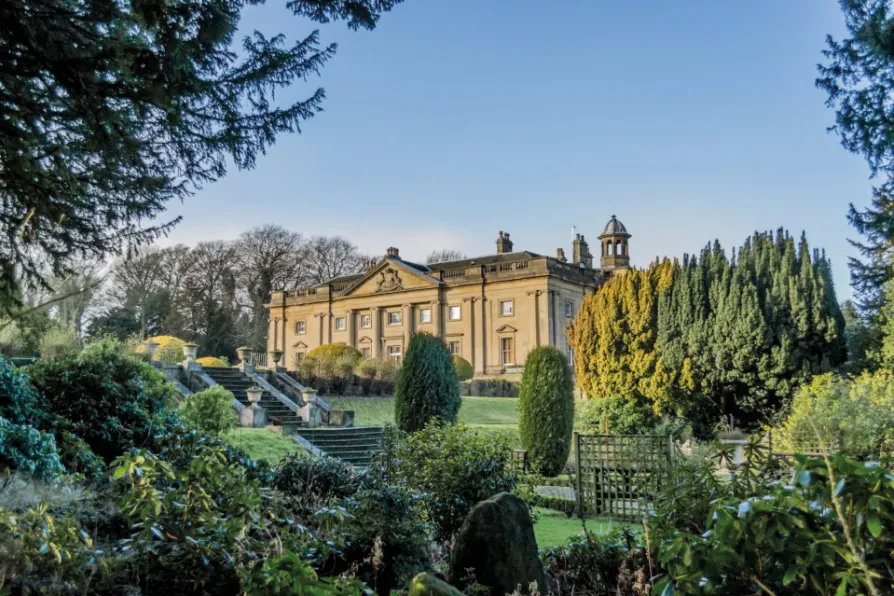NICK MATTHEWS recalls how the ideals of socialism and the holding of goods in common have an older provenance than you might think
MICHAEL BAILEY invites readers to Wortley Hall, where aristocratic portraits have been replaced by Marx, Morris and Pankhurst, for a weekend of political education and socialist celebration


WORTLEY HALL is set to once again welcome visitors for the annual South Yorkshire Festival on Sunday August 10, with events running from 11am to 5pm.
Formerly the ancestral home of the Earls of Wharncliffe, Wortley Hall looks like any other country estate, complete with a long, winding drive leading to a grand 18th century stone-pillared mansion, set within 26 acres of ancient gardens and woodland.
But unlike most stately homes, this Grade II listed building has belonged to the trade union, labour and co-operative movement from the 1950s onwards. Since then, it has served as an important residential venue for workers’ education, leisure and political activity, with space to accommodate more than 100 overnight guests.
Where aristocratic portraits once hung, the walls are now decorated with pictures of radicals and trade unionists such as Karl Marx, William Morris, Tom Mann, Robert Owen, Keir Hardie, Sylvia Pankhurst, George Arthur Roberts, Abe Moffat, George Caborn, Bill Ronksley and Fleur Lombard, among others.
The Morning Star has long been the daily newspaper of choice, freely available to guests in the hall’s reception.
As in previous years, the workers’ stately home is expecting over 2,000 visitors at next month’s gathering. The programme will feature stalls hosted by trade unions and campaign groups, alongside political speeches, live music and a variety of children’s activities. Guests can also enjoy an outdoor barbecue and bar throughout the day.
This year’s festival commemorates the 40th anniversary of the miners and their families marching back to work with their “heads held high” after a historic year-long strike against pit closures and a fiercely anti-union Tory government, aided and abetted by the police and the media.
Among the highlights is a meeting organised by the Campaign for Press and Broadcasting Freedom (North), where ex-BBC industrial correspondent Nick Jones will reflect on how news cartoonists portrayed the strike.
Hilary Cave, former education officer for the National Union of Mineworkers, will take to the stage to share insights from her recently published recollections of the 1984-85 miners’ strike. Her talk is sure to evoke strong memories for miners, their families and those who stood in solidarity.
The festival plays an important role in bringing together the local community and trade unionists from across the region and beyond, reinforcing our shared values and commitment to the wider labour movement.
The workers’ stately home not only provides a scenic backdrop, but also serves year-round as a venue for trade union residential schools and other progressive events, offering a unique space rooted in South Yorkshire’s rich political heritage.
The evening before the festival, the hall will host the much-anticipated annual Sylvia Pankhurst Memorial Lecture. This year’s event focuses on spycops and will be delivered by a participant in the decade-long Undercover Policing Inquiry, which is investigating cases of women deceived into sexual relationships by undercover police officers.
“The Pankhurst Memorial Committee recognise the connection between Pankhurst and the secret state,” says Mary Davis, member of the Sylvia Pankhurst Memorial Committee (SPMC) and a director of Police Spies Out of Lives.
Pankhurst well understood the power of the state. She suffered first hand from state repression and secret surveillance. In 1920, she was jailed for six months — this time not as a suffragette but for sedition as a communist revolutionary and staunch defender of the USSR.
In court, she was very clear: “Although I have been a socialist all my life, I have tried to palliate the capitalist system, but all my experience showed that it was useless trying to palliate an impossible system. This is a wrong system and has got to be smashed. I would give my life to smash it.”
“Pankhurst spent her life campaigning to do exactly that,” says Megan Dobney, also of the SPMC. “This is a main reason we continue campaigning for a statue for Pankhurst, to highlight that hers was an intensely political life.”
The lecture takes place at 7pm on Saturday August 9, at Wortley Hall, Sheffield S35 7DB.
Additional information about the SPMC can be found on the campaign’s website sylviapankhurst.gn.apc.org.
Morning Star readers who would like to book a stall at the festival or explore becoming shareholders in Wortley Hall are warmly encouraged to email: politicalsecretary@wortleyhall.org.uk.
Those curious about the hall’s postwar history can read a free-to-access article (available until September 2025) recently published by Labour History Review bit.ly/Wortley25.










